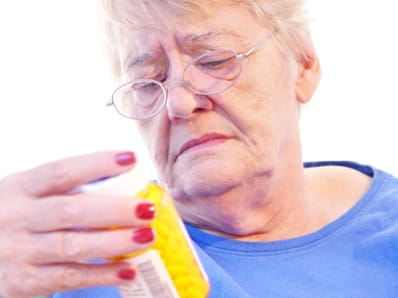Hospitalization of Seniors from Medication Side Effects from "Blood Thinners" and Diabetes Drugs Send Seniors to the Hospital

The Bottom Line
Every year, nearly 100,000 adults aged 65 and older are admitted to the hospital for drug side effects. In a recent study, the majority of problems were caused by "blood thinners" (warfarin and other oral anti-thrombosis drugs) and diabetes drugs (insulin and oral diabetes medicines).

The Full Story
Every year, nearly 100,000 adults aged 65 and older are admitted to the hospital for drug side effects. In a recent study, the majority of problems were caused by "blood thinners" (warfarin and other oral anti-thrombosis drugs) and diabetes drugs (insulin and oral diabetes medicines). Preventing serious side effects is a job for the patient, the family, caregivers, and health professionals.
The drugs we commonly call "blood thinners" don't actually make the blood thin. Instead, they prevent the blood from forming clots, or they prevent existing clots from getting bigger. A blood clot that forms in veins or arteries is called a thrombosis. It can stick to the side of the blood vessel wall, causing inflammation. More dangerously, it can travel through the blood. A blood clot in the heart can cause a heart attack. In the brain, it can cause a stroke. A blood clot in the lungs can cause sudden death.
Anti-thrombosis drugs - "blood thinners" - are given to some people to prevent heart attacks and strokes. In people who already have had a heart attack or stroke, these drugs can help prevent another episode. Other conditions for which anti-thrombosis drugs are prescribed include atrial fibrillation (an irregular heart rhythm), surgery to place artificial heart valves, and blood clots in the legs.
Just like a blood clot that forms on a cut, clots in veins and arteries have two parts. Thrombin is like fibers that stick together to get the clot started. Platelets are a type of blood cell that stick together and help the clot get bigger and stronger.
Some of the anti-thrombosis drugs that people take at home affect thrombin. Examples include warfarin (Coumadin®), dabigatran (Pradaxa®), and rivaroxaban (Xarelto®). Others affect the "stickiness" of blood platelets. Examples are aspirin, dipyridamole, clopidogrel (Plavix®), prasugrel (Effient®), and ticlopidine (Ticlid®).
Excess bleeding is a serious side effect of any anti-thrombosis drug. To avoid a trip to the hospital, people who take these drugs must:
- Follow label instructions carefully. For some drugs, it’s important to avoid eating certain foods. For others, you may need to avoid taking certain other medicines.
- Go for blood tests as often as the doctor prescribes. Some tests check how fast or slow the blood clots. Others check the liver, which breaks down many of these medicines.
- Watch for signs of bleeding.
Call your doctor right away for any of these symptoms:
- Bleeding gums
- Bleeding after shaving that lasts longer than usual
- Red or brown urine
- Red or black stools
- Unusual bruises
- An unusually heavy menstrual period
- A bad headache
- Bad stomach pain
- An accident or fall
Diabetes drugs accounted for another large group of seniors admitted for dangerous side effects. Two types of diabetes drugs were responsible: insulins (there are several types, all given by injection) and pills.
Diabetes is an illness that prevents the body from making and/or using insulin. Insulin is a hormone produced by the pancreas. It helps glucose move from the blood stream to the inside of cells which use glucose for energy.
Most adults with diabetes have Type 2 diabetes. In some people with Type 2 diabetes, the pancreas doesn't produce enough insulin. In others, insulin is produced but cells prevent it from helping glucose move into cells; this is called insulin resistance. If glucose remains in the blood stream (high blood sugar), it can cause serious complications - nerve damage, blindness, heart disease, blood vessel disease leading to amputations, and kidney failure. That's why drugs to control blood sugar are so important.
There are several types of insulin; all are given by injection, once daily or more frequently. There also are several types of diabetes pills. Some cause the pancreas to release more insulin. Other pills help make cells more sensitive to insulin, allowing glucose to move from the bloodstream into the cells. Yet others change how the body absorbs carbohydrates, which in turn affects blood glucose levels. Names of some diabetes medicines are glipizide (Glucotrol®), glyburide (Micronase®), metformin (Glucophage®), and sitagliptin (Januvia®).
Insulin and some diabetes pills can cause the blood sugar to drop too low; this is called hypoglycemia. When this happens, the brain and other vital organs don’t get enough glucose to meet their energy requirements. The result can be headache, fatigue, tremors, seizures, and even death. (This is why many people with diabetes, or their caretakers, need to monitor blood sugar so carefully.) Low blood sugar is a medical emergency.
Preventing and recognizing serious side effects are both important ways to keep senior citizens out of the hospital. Here are a few tips:
- Bring a list of all medicines - or the medicines themselves - to every doctor's appointment. Include prescription medicine, non-prescription medicine, vitamins, and all kinds of supplements. Make sure that every doctor knows about all of your medicines. This can prevent overdoses if, for example, one doctor prescribes a brand-name drug and another doctor prescribes the same drug by its generic name.
- When possible, fill all prescriptions at the same pharmacy. Tell the pharmacist about all other medicines you take - non-prescription, vitamins, and supplements. This will allow the pharmacist to check for drug interactions.
- Ask your health provider or pharmacist about what side effects you might have. Ask which ones are dangerous and what you should do if they happen.
- Carry a list of your drugs with you. That way, if you become ill away from home, doctors will know what medicines you take.
- Keep every doctor's appointment.
- Have lab work done as often as the doctor recommends.
- Take your medicines exactly as the label recommends. Ask the pharmacist for help if you're not sure what the instructions mean.
- Call your doctor if you have a question about how you feel.
- If you make a mistake with your medicine, use the webPOISONCONTROL® online tool for guidance or call Poison Control right away at 1-800-222-1222. All help is free and confidential.
Take-Home Messages:
- Every year, nearly 100,000 adults aged 65 and older are admitted to the hospital for drug side effects.
- In a recent study, the majority of problems were caused by"blood thinners" (warfarin and other oral anti-thrombosis drugs) and diabetes drugs (insulin and oral diabetes medicines).
- Preventing serious side effects is a job for the patient, the family, caregivers, and health professionals.
Rose Ann Gould Soloway, RN, BSN, MSEd, DABAT emerita
Clinical Toxicologist
Poisoned?
Call 1-800-222-1222 or
Prevention Tips
Preventing and recognizing serious side effects are both important ways to keep senior citizens out of the hospital.
- Bring a list of all medicines - or the medicines themselves - to every doctor's appointment.
- When possible, fill all prescriptions at the same pharmacy.
- Ask your health provider or pharmacist about what side effects you might have.
- Carry a list of your drugs with you.
- Keep every doctor’s appointment.
- Have lab work done as often as the doctor recommends.
- Take your medicines exactly as the label recommends. Ask the pharmacist for help if you’re not sure what the instructions mean.
- Call your doctor if you have a question about how you feel.
This Really Happened
Case 1: A 78-year-old woman was taking her prescribed dose of Coumadin® (an anticoagulant, or blood thinner) 5 mg daily for about a month. She began to have black stools and was coughing up blood clots. She awoke one morning with a mouthful of blood and was brought to the hospital. Studies of her blood (coagulation studies) confirmed the reason: too much blood thinner had built up in her system. Poison Control recommended vitamin K. After one dose her coagulation studies improved and her symptoms resolved. She was hospitalized for 2 days.
Case 2: A 69-year-old man took his prescribed dose of glipizide (a drug used to lower the blood glucose level) extended-release 10 mg. The following day he appeared confused. He was brought into the emergency room with a very low blood sugar level. Poison Control advised the emergency physician that the low blood sugar could last for 72 hours with this medication.The patient was given intravenous (IV) high-percentage dextrose, ate food and was started on an IV dextrose drip. On hospital day 4 he was restarted on glipizide at a lower dose. His blood sugar levels were normal and he was discharged on hospital day 5.
For More Information
References
Poisoned?
Call 1-800-222-1222 or
Prevention Tips
Preventing and recognizing serious side effects are both important ways to keep senior citizens out of the hospital.
- Bring a list of all medicines - or the medicines themselves - to every doctor's appointment.
- When possible, fill all prescriptions at the same pharmacy.
- Ask your health provider or pharmacist about what side effects you might have.
- Carry a list of your drugs with you.
- Keep every doctor’s appointment.
- Have lab work done as often as the doctor recommends.
- Take your medicines exactly as the label recommends. Ask the pharmacist for help if you’re not sure what the instructions mean.
- Call your doctor if you have a question about how you feel.
This Really Happened
Case 1: A 78-year-old woman was taking her prescribed dose of Coumadin® (an anticoagulant, or blood thinner) 5 mg daily for about a month. She began to have black stools and was coughing up blood clots. She awoke one morning with a mouthful of blood and was brought to the hospital. Studies of her blood (coagulation studies) confirmed the reason: too much blood thinner had built up in her system. Poison Control recommended vitamin K. After one dose her coagulation studies improved and her symptoms resolved. She was hospitalized for 2 days.
Case 2: A 69-year-old man took his prescribed dose of glipizide (a drug used to lower the blood glucose level) extended-release 10 mg. The following day he appeared confused. He was brought into the emergency room with a very low blood sugar level. Poison Control advised the emergency physician that the low blood sugar could last for 72 hours with this medication.The patient was given intravenous (IV) high-percentage dextrose, ate food and was started on an IV dextrose drip. On hospital day 4 he was restarted on glipizide at a lower dose. His blood sugar levels were normal and he was discharged on hospital day 5.
